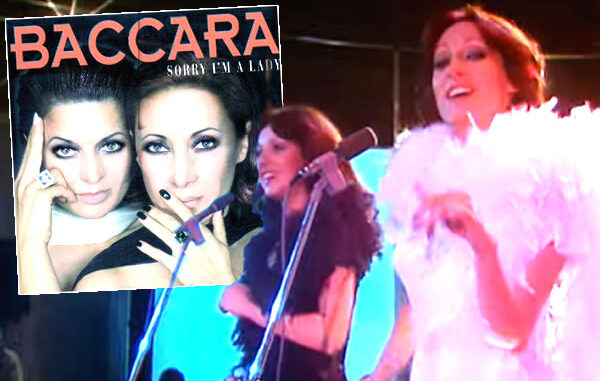
In the late 1970s, the European disco scene was electrified by the sensational hit “Sorry, I’m a Lady” by the Spanish female duo Baccara.

Consisting of Mayte Mateos and María Mendiola, Baccara became a staple in discos and clubs across the continent with their sexually provocative lyrics and catchy dance rhythms.
The song not only catapulted the duo to stardom but also left an indelible mark on the music landscape of the time.
The Formation of Baccara
Baccara was formed in 1977 by two former flamenco dancers, Mayte Mateos and María Mendiola. The duo met while performing as part of a Spanish television ballet and quickly realized they had a shared passion for music and dance.
Their unique blend of flamenco and pop influences, coupled with their striking visual appeal, caught the attention of RCA Records executives.
The label saw potential in the duo and soon signed them, leading to the creation of their first hit, “Yes Sir, I Can Boogie.”
The Provocative Nature of “Sorry, I’m a Lady”
Following the success of “Yes Sir, I Can Boogie,” Baccara released “Sorry, I’m a Lady” in 1977. The song’s lyrics, which were considered provocative at the time, played a significant role in its appeal.
With lines like “Sorry, I’m a lady, sorry, I’m a lady, I would rather be just a little shady,” the song’s playful and flirtatious tone resonated with audiences, particularly in the disco and club scenes.
The combination of the infectious melody and the duo’s sultry performance style made “Sorry, I’m a Lady” an instant hit.
Success in Europe and Beyond
“Sorry, I’m a Lady” achieved remarkable success across Europe. It topped the charts in several countries, including Germany, where it remained at number one for several weeks.
The song also enjoyed significant popularity in Sweden, Switzerland, and Norway. In the UK, it reached the top ten, further solidifying Baccara’s status as a disco powerhouse.
The song’s appeal wasn’t limited to Europe; it also found an audience in other parts of the world. In Australia, it became a popular track in clubs and discos, and it even made its way to the United States, where it received airplay in major cities with vibrant disco scenes.
The global success of “Sorry, I’m a Lady” was a testament to Baccara’s universal appeal and the infectious nature of their music.
The Cultural Impact of Baccara
Baccara’s music was emblematic of the late 1970s disco era, a time when dance music was at its peak.
Their songs, characterised by their catchy melodies and glamorous performances, captured the spirit of the disco movement.
The duo’s glamorous image and provocative lyrics also challenged the conventional norms of the time, pushing the boundaries of what was acceptable in pop music.
“Sorry, I’m a Lady” in particular became an anthem in the gay community, where it was celebrated for its playful and unapologetic embrace of femininity and sexuality.
The song’s bold and confident message resonated with many, making it a favourite in clubs and discos worldwide.
The Legacy of ‘Sorry, I’m a Lady’
Today, “Sorry, I’m a Lady” remains a classic of the disco era, fondly remembered by those who experienced its initial release and discovered by new generations of music lovers. The song’s enduring popularity is a testament to its timeless appeal and the impact Baccara had on the music industry.
Baccara continued to release music throughout the late 1970s and early 1980s, though they never quite recaptured the same level of success as they did with their early hits. Nonetheless, their contribution to the disco genre and their influence on pop music is undeniable.
Capitol fm plays this favourite 70’s Disco Hit
Baccara’s ‘Sorry, I’m a Lady’ is more than just a disco hit; it is a cultural phenomenon that encapsulates the spirit of a bygone era.
The song’s success across Europe and beyond, coupled with its provocative lyrics and infectious melody, made it a staple in discos and clubs.
Baccara’s glamorous image and bold performance style challenged the norms of the time and left a lasting legacy in the music industry.
Even today, “Sorry, I’m a Lady” continues to be celebrated as a classic, a testament to the enduring appeal of Baccara and their music.
